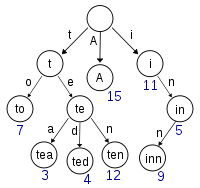Yesterday’s post from Programming Praxis gives a new (or at least different) vantage point on one of the most common problems in Computer Science: sorting. Today, we’re going to implement a data structure known as a splay heap and use that to perform a heapsort.
JP's Blog
Programming, Topic: Data Structures
Recent posts (Page 6 of 6)
Bitvectors in Racket
A bit shorter on time today, so I’ve just got a quick library that I worked out to solve another problem (I’ll post it later this week when it’s actually working). Basically, when you need to store a heck of a lot of binary flags and don’t want to waste space, the best way to do it would be as one long list of bits. It’s really easy to do in a language like C, but how can you do it in Racket?
Memoization in Racket
Memoization is awesome!
I’ve already written one post on the subject in Python, but this time we’ll do the same in Racket. It’s particularly timely as without it, today’s post on determining the number of prime partitions of a number would take longer to run than I care to wait.
Dictionary tries in Racket
For the next few posts, we’re going to need a way to represent a dictionary. You could go with just a flat list containing all of the words in the dictionary, but the runtime doesn’t seem optimal. Instead, we want a data structure that lets you easily get all possible words that start with a given prefix. We want a trie.

Evaluating prefix/infix/postfix expressions
In yesterday’s post, I talked about three different ways to write expressions: prefix, infix, and postfix expressions. I also promised to write up a web-based example that would show the guts of each algorithm in action. Well, here it is!
Use the three buttons at the top to switch between the different machines. Enter an expression in the box and click run to evaluate it. The only things that are supported at the moment are numbers (integers or floating point) and the operators +, -, *, and /, although the code is extensible enough that adding more shouldn’t be an issue.
Three ways to write expressions
(- (- (+ 4 (* 2 7)) (* (- 1 6) 5)) 1)
is the same as
4 + 2 * 7 - (1 - 6) * 5 - 1
is the same as
4 2 7 * + 1 6 - 5 * - 1 -
Madness right?
All posts
- 2025-12-11: AoC 2025 Day 11: Graphinator
- 2024-12-22: AoC 2024 Day 22: Xorshiftinator
- 2024-12-05: AoC 2024 Day 5: (Not) Transitivinator
- 2023-08-12: StackLang Part IX: Better Testing
- 2023-08-11: StackLang Part VIII: Compiler Stacks
- 2023-08-05: StackLang Part VII: New CLI and Datatypes
- 2023-07-16: StackLang Part VI: Some Examples
- 2023-07-12: StackLang Part V: Compiling to C
- 2023-05-01: StackLang Part IV: An Interpreter
- 2023-04-24: StackLang Part III: The Parser
- 2023-04-16: StackLang Part II: The Lexer
- 2023-04-14: StackLang Part I: The Idea
- 2023-01-31: Cloning Redis in Rust: RESP [Part 1]
- 2022-12-21: AoC 2022 Day 21: Yellinator
- 2022-12-18: AoC 2022 Day 18: Lavinator
- 2022-12-08: AoC 2022 Day 8: Treetopinator
- 2022-12-06: AoC 2022 Day 6: Ring Buffinator
- 2022-12-05: AoC 2022 Day 5: Stackinator
- 2021-12-25: AoC 2021 Day 25: Cucumbinator
- 2021-12-24: AoC 2021 Day 24: Aluinator
- 2021-12-22: AoC 2021 Day 22: Cubinator
- 2021-12-20: AoC 2021 Day 20: Enhancinator
- 2021-12-19: AoC 2021 Day 19: Point Matchinator
- 2021-12-18: AoC 2021 Day 18: Pairs of Pairs
- 2021-12-16: AoC 2021 Day 16: Depacketinator
- 2021-12-12: AoC 2021 Day 12: Submarine Spider
- 2021-12-11: AoC 2021 Day 11: Octopus Flashinator
- 2021-12-10: AoC 2021 Day 10: Chunkinator
- 2021-12-09: AoC 2021 Day 9: Local Minimum Deminifier
- 2017-12-12: AoC 2017 Day 12: Gridlock
- 2017-12-07: AoC 2017 Day 7: Tree
- 2017-12-06: AoC 2017 Day 6: Tightrope
- 2017-12-03: AoC 2017 Day 3: Spiraly
- 2016-12-20: AoC 2016 Day 20: Filter Table
- 2016-12-11: AoC 2016 Day 11: Radiation Avoider
- 2015-01-29: iOS Backups in Racket: Apps
- 2015-01-27: iOS Backups in Racket: Messages
- 2015-01-23: iOS Backups in Racket: Contacts
- 2015-01-22: iOS Backups in Racket: Groundwork
- 2014-06-17: Factor trees
- 2014-05-28: Quadtree image compression
- 2014-01-15: Graph coloring
- 2014-01-14: Graph radius
- 2013-12-23: Edges to adjacency
- 2013-10-09: Functions as lists
- 2013-09-27: Large scale asynchronous DNS scans
- 2013-09-25: Extending Racket's DNS capabilities
- 2013-09-23: Extending Racket structs to bitfields
- 2013-04-09: Cyclic equality
- 2013-01-24: Splay heaps redux-imperative model
- 2013-01-23: Sorting via splay heap
- 2012-10-29: Bitvectors in Racket
- 2012-10-20: Memoization in Racket
- 2012-10-11: Dictionary tries in Racket
- 2012-10-08: Evaluating prefix/infix/postfix expressions
- 2012-10-07: Three ways to write expressions
